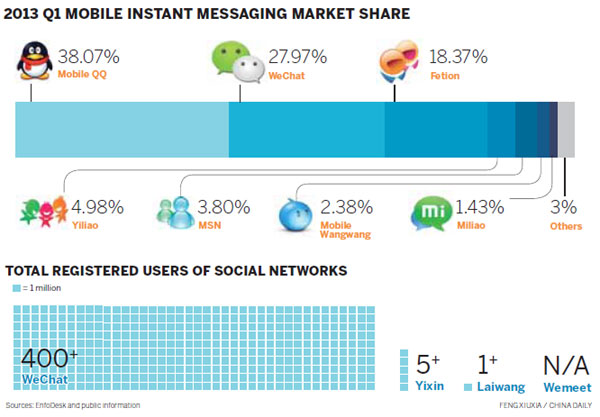 |
China's market for mobile chat applications has never been so crowded especially after Alibaba Group Holding Ltd - the country's largest e-commerce company - officially joined the fray on Monday with the launch of its first social networking app.
The app named Laiwang, which means come and go in Chinese, is the first product unveiled to the public after the company announced an internal restructuring program earlier this month with a strong focus on the mobile Internet business.
"We're a company with strong e-commerce genes, but we simply want to build a platform to keep people closer and to meet their social networking demands in the mobile Internet era," said Jonathan Lu Zhaoxi, Alibaba's chief executive officer, who is now also leading the company's newly formed Internet communication division.
He said that the era of the personal computer has ended and that his company's expansion to social networking systems is a natural evolution driven by the public's growing reliance on mobile phones.
He denied rumors suggesting that Alibaba's new app launch was due to the success of WeChat, the reigning mobile messaging service in China, which is owned by Tencent Holdings Ltd, Alibaba's archrival.
Analysts agreed with Lu, saying that the main reason prompting many players to jump into the mobile chatting app market is because messaging apps, which are seeing "rigid demand" from consumers, can help companies to lock up a great number of mobile Internet users.
"Communication is a basic need. By launching those apps, companies can easily accumulate a lot of mobile Internet users. The apps work as an entry to the mobile internet era," said Wang Jun, senior analyst with Beijing-based research firm Analysys International.
Figures from the Ministry of Industry and Information Technology said that the number of China's mobile Internet users exceeded 800 million earlier this year.
Data from Analysys International showed that the accumulated number of mobile instant messaging accounts in China jumped 85.2 percent year-on-year to 1.22 billion in the first quarter of this year.
Alibaba is certainly not the only company to have discovered the importance of an entry point to the market. On Aug 19, Chinese operator China Telecom Corp Ltd unveiled its mobile messaging app, known as Yixin, in collaboration with Internet firm NetEase Inc.
Three days later, WeMeet, a messaging app that shares some features with WeChat, was launched by Hangzhou Kuyue Tech, which Sina Corp invested in.
The new apps have always been compared with Tencent's WeChat, the most popular mobile chatting app with more than 400 million registered users in China. And Alibaba's Laiwang is no exception.
Laiwang shares some features with WeChat, such as the ability to send messages and share pictures, but it also has some new features, such as a hand drawing sharing function and the possibility of automatically deleting messages right after the recipients view them.

 Storms leave 97 dead, 58 missing in Mexico
Storms leave 97 dead, 58 missing in Mexico New model of indigenous surface-to-air missiles testfired
New model of indigenous surface-to-air missiles testfired  118.28-carat diamond to be auctioned in HK
118.28-carat diamond to be auctioned in HK Maternal love under streetlight
Maternal love under streetlight Naked foreign student sits in the middle of a road in Haikou
Naked foreign student sits in the middle of a road in Haikou  Colorful Yunnan: Enjoy the natural beauty
Colorful Yunnan: Enjoy the natural beauty Harbin named Chinese city with most beautiful women
Harbin named Chinese city with most beautiful women New college students' military training in Guangzhou
New college students' military training in Guangzhou Rugby girls
Rugby girls PLA's 38th Group Army conduct training
PLA's 38th Group Army conduct training Residences of the royal house of Savoy
Residences of the royal house of Savoy The last days of Wan Aihua
The last days of Wan Aihua Highlights at 12th National Games of China
Highlights at 12th National Games of China Beijing Film Academy welcomes freshmen
Beijing Film Academy welcomes freshmen Large mahjong party sets new world record
Large mahjong party sets new world recordDay|Week|Month